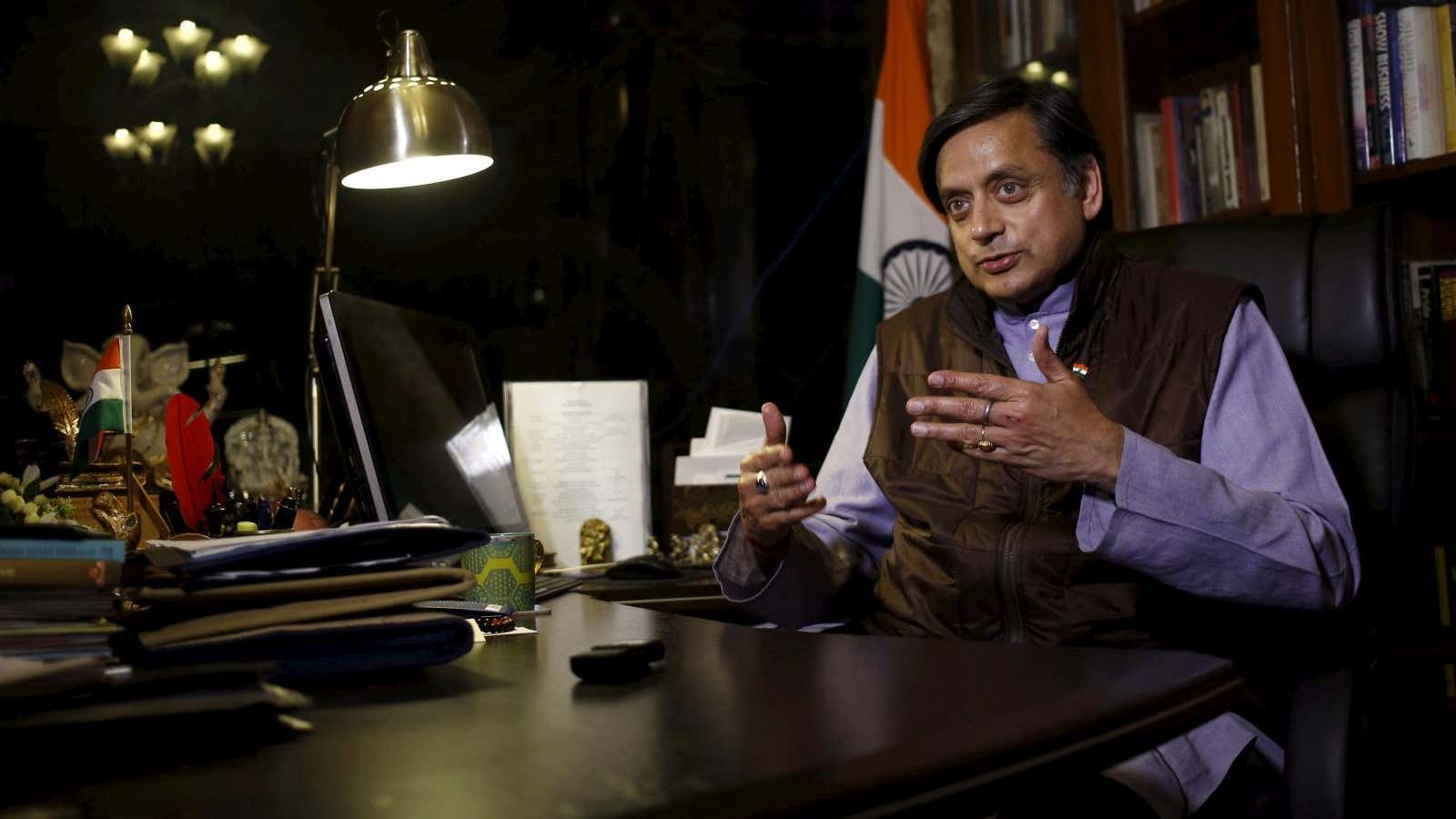Hectic campaigning for the third phase of Indian parliamentary elections has ended. Tomorrow (April 23) people across 14 states and union territories will head out to vote. Of the 116 seats up for grabs, Thiruvananthapuram, the capital of the southern Indian state of Kerala, is expected to have a nail-biting finish.
The triangular fight here is among the Indian National Congress’s Shashi Tharoor, a former top UN diplomat and incumbent parliamentarian, the Bharatiya Janata Party’s (BJP) Kummanam Rajasekharan, former governor of the northeastern state of Mizoram, and the Left’s C Divakaran, former Kerala food minister.
If Tharoor wins, it will be hattrick for him. In 2009, he had won by nearly 100,000 votes; the margin fell drastically to just over 15,000 votes in 2014. This time around, the BJP has managed to make further inroads, which may end up splitting the constituency’s Hindu votes, Tharoor acknowledges. His loss can be a major blow to the Congress at the national level as well.
The BJP’s poll plank has been Sabarimala, by now an important electoral point for the Congress as well, Tharoor acknowledged in an exclusive interview with Quartz.
Women of menstruating age had been forbidden from entering the Sabarimala temple by tradition for years. This changed last year following a supreme court verdict, sparking a furore among a segment of the population. Narendra Modi’s BJP sensed a political opportunity in this and, despite initially welcoming the apex court ruling, flipped its stand later.
Edited excerpts from the interview:
How important is Sabarimala as far as elections are concerned?
It is a fairly important issue in Thiruvananthapuram, especially considering the demographics of the state which is 68% Hindu. The upper caste Nair population here (in Thirivananthapuram) is 28% so you have very fertile ground for the BJP’s message, which is targeting a certain communal identity. Nonetheless, I am surprised to see that the BJP has managed to make as many inroads as they have in Thiruvananthapuram on the strength of the Sabarimala issue alone. Because from the point of the Hindu believers, it is clear the BJP has betrayed them on the issue. As the party being in power, it had the authority to ease the pain and distress of the believers.
What are you suggesting the BJP ought to have done?
The first was to file a review petition and get the supreme court to change its mind. They can also bring in a law to change and overturn the judgment. Or you use your authority and introduce an ordinance. But they didn’t do any of these. So I am surprised the BJP propaganda is so effective that it is reaching people when the question remains ‘what has the BJP done to deserve your support?’ I have been raising the issue while they have been ducking it. So I am in a state of some astonishment that the middle-class voters in Thiruvananthapuram appear to have bought the BJP line.
Do you fear the Hindu votes are going away from the Congress if the party doesn’t talk about Sabarimala?
Yes, somewhat. There have been surveys in Thiruvananthapuram that have shown a significant shift of the Hindu or the Nair votes towards the BJP with a very specific reason being given as Sabarimala. It is very transparent that the BJP is using the issue in a very communal manner to tell Hindu voters that Hinduism is in danger and we will be the only party that will protect you—the same message that they have been saying in the north of India. So my message is just that Hindu voters should not get fooled.
You are calling BJP communal but are also using the same card. How does that add up?
Well, you cannot afford to write off the votes of the majority in times of political interest. So we are showing them that what the BJP is doing is misguided.
You had initially supported the Sabarimala verdict but had later changed your stance, why did you do that and how do you think that affects your liberal stance?
As a political representative, I have to be receptive to people in my own constituency and here the people, particularly women, were saying that for us it is not a problem and is not a matter of equality. Instead, it is a matter of sanctity and we feel we have been kicked in the stomach with the verdict. So when women in Kerala, including the women in my family, were saying this to me, that is when I began to realise that framing the issue as one of equality is doing it a great disservice. It was actually not as simple as an instinctive liberal reaction would have suggested. In fact, I explained this via my writing as well and my liberal friends did feel let down. But politics is also about representation, you cannot hope to represent people if you are completely out of sync with what they believe in.
You have also often been accused of brandishing your upper caste Hindu image. What do you have to say about that?
I grew up in an environment where I wasn’t encouraged to think about caste or even know about it. In fact, I only got to know what my caste was when I was in school in Mumbai and Rishi Kapoor (Bollywood actor) had asked me what my caste was, and I had to go home and ask my parents about it. That is when I first discovered it and I still do not take it as a precondition for any professional or personal relationship. So I am always a bit bewildered by this accusation.
Read Quartz’s coverage of the 2019 Indian general election here.
